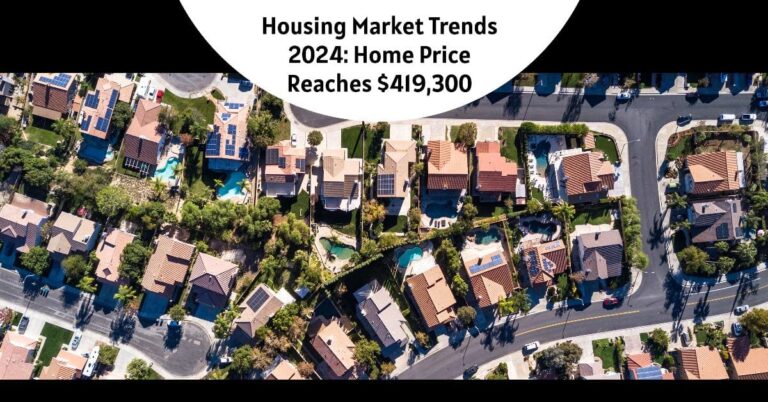of US Housing Market has experienced a significant decline Home Sales In May 2024, it declined for three consecutive months. This trend continues. Rising mortgage rates and Home prices reach record highwhich poses a major challenge for prospective home buyers.
According to recent data, Selling a used home fell 0.7% May figures are seasonally adjusted annual rates compared to the previous month. 4.11 millionThis decrease is also reflected in the year-on-year comparison, 2.8% These figures were below market expectations but slightly ahead of the expected pace of growth. 4.07 million.
Lawrence Yun, chief economist for the National Association of Realtors, expressed surprise at the market’s performance because he expected the housing market to bounce back in the traditional spring season.
But house prices continue to rise 11 consecutive months This is an increase compared to the previous year. National average sales price Rose 5.8% The highest amount ever $419,300this is surprising 51% That’s up from five years ago. This price increase comes despite slowing sales in the market and an increase in the supply of available properties, which has reached its highest level in four years.
The housing market downturn will be felt in 2022. Mortgage interest rates They’ve been on an upward trajectory since hitting pandemic-era lows, with the average interest rate on a 30-year mortgage hitting a 23-year high. 7.79% According to Freddie Mac, existing home sales last year fell to the lowest level in 30 years.
of Federal Reserve Stance Interest rate policy is also playing a role in shaping the current market environment. Stronger than expected inflation reports have led the Fed to keep short-term interest rates at their highest in the past 20 years. However, a rate cut is expected later this year, which could provide some relief to the market.
The “lock-in” effect is another factor influencing market trends: Many homeowners who took out mortgages or refinanced at interest rates below 3% or 4% two or more years ago are now hesitant to sell because they don’t want to lose those favorable rates.
Looking at the broader trends, 35.2% The number of homes for sale has increased compared to last year, marking the seventh consecutive month of increase. New listings are also on the rise. 6.2% Despite these positive signs, the median price of homes for sale has remained relatively stable. 0.3% To growth $442,500.
As the market weathers these difficult times, it will gradually become more Buyer-friendly environmentThis transition is expected as mortgage rates are expected to decline over the coming year and the inventory of homes for sale continues to grow.
The impact of rising mortgage rates on home sales
of Impact of rising mortgage interest rates It is multifaceted and has a significant impact on many aspects of the housing market and the economy as a whole.
- Home buying challenges for home buyers: Rising mortgage interest rates increase the cost of borrowing to buy a home. This can increase monthly mortgage payments and make homebuying unaffordable for many. It can make it more difficult for prospective buyers to enter the housing market, especially first-time buyers who can’t come up with a large down payment to offset rising interest rates.
- Decreasing demand for housingRising mortgage rates generally lead to a decline in demand for housing. Higher borrowing costs may encourage some potential buyers to postpone home purchases or choose less expensive properties than originally planned. This could slow the pace of home sales and dampen a thriving housing market.
- Impact on house pricesA decline in demand could also put downward pressure on home prices. This wouldn’t necessarily happen immediately, but over time, as mortgage rates remain high and demand weakens, home prices could stabilize or, in some markets, even fall.
- Refinancing activity slowsWhen mortgage interest rates rise, homeowners are less likely to refinance their existing mortgages. Because refinancing at a higher interest rate comes with less favorable terms, homeowners have little incentive to refinance unless they need to tap into their home equity.
- Home equity growth may slow: As home price growth slows or reverses, the home equity gains that many homeowners have enjoyed in recent years may also slow. This means that the equity homeowners have accumulated in their real estate may decrease, which could impact their overall financial security.
- Rental market impact: As housing becomes more difficult to buy, more people may choose to rent, increasing demand in the rental market, which could lead to higher rental prices, especially in areas where housing supply is already tight.
- Lender profitability: As mortgage lending volumes decline, mortgage lenders’ profitability may decline. With fewer people buying or refinancing homes, lenders face a smaller pool of borrowers, which could increase competition and affect their profits.
- Broader economic impactThe housing market is a key component of the economy, and changes in mortgage rates can have ripple effects. For example, a decline in homebuying activity could lead to reduced spending on housing-related goods and services, which could impact economic growth.
Therefore US Housing Market We are currently in a period of adjustment. Rising mortgage rates and High price Sales are being impacted. However, there are signs of change that could benefit buyers in the near future. Prospective home buyers and sellers need to stay informed about and adapt to changing market conditions.
See also:

